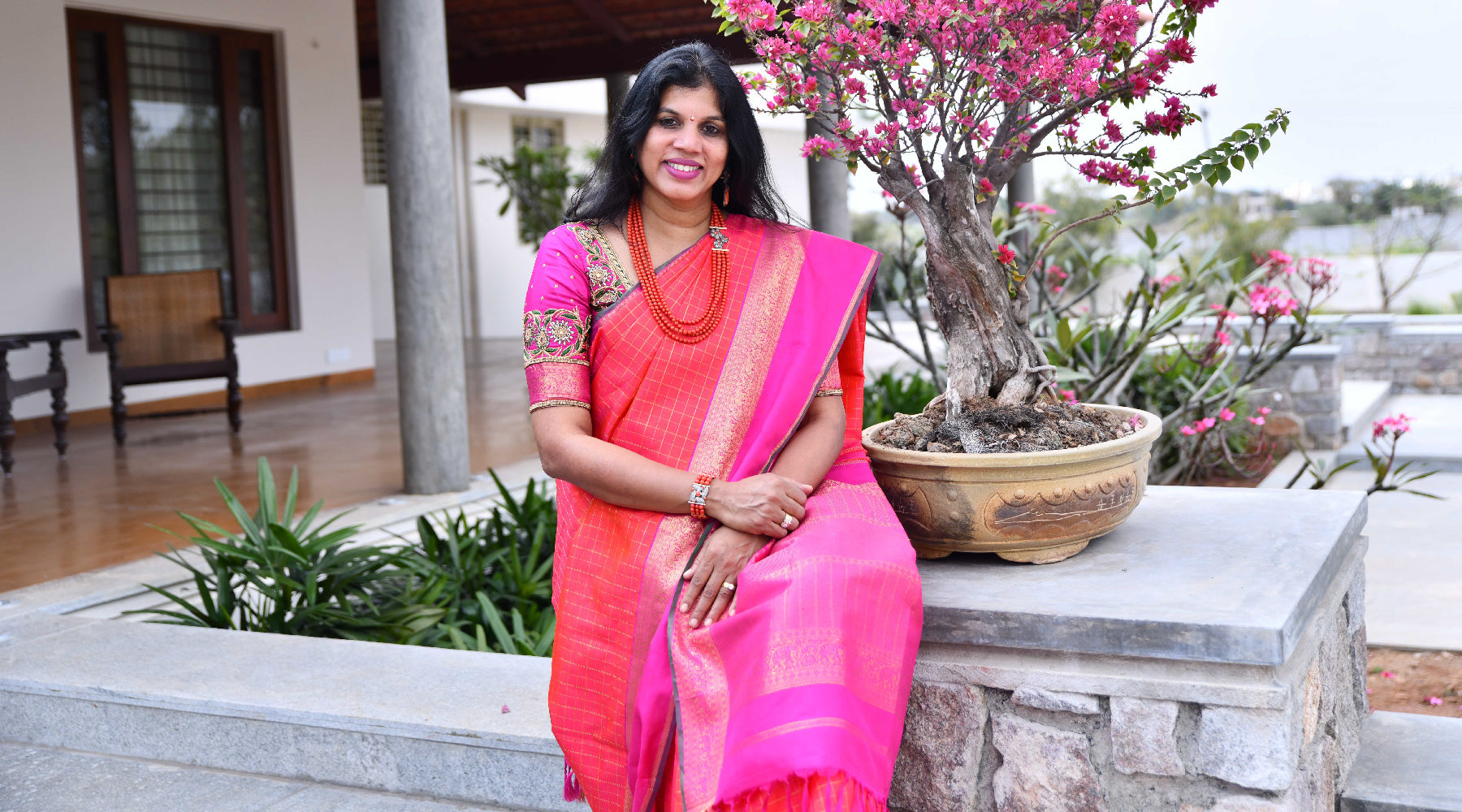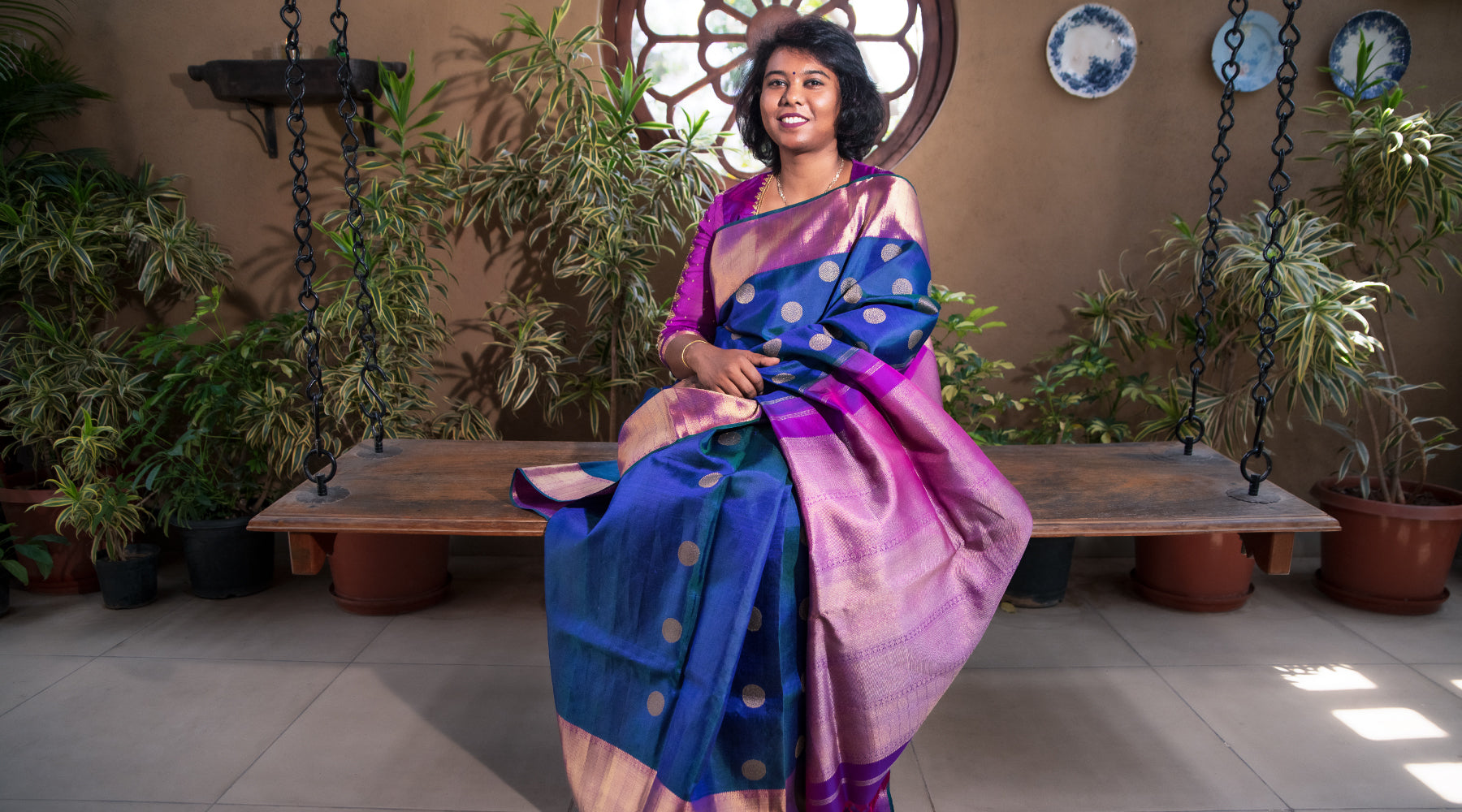KANAKAVALLI VIGNETTES : Dr.Renuka David - Seasons Of Adventure

Today, as we celebrate Women's Day and all the strong, beautiful women we know, we're delighted to feature the amazing Dr. Renuka David, Kanakavalli’s March Vignette, who has had a life of adventure - she spent her childhood in different parts of the country as the daughter of an Air Force officer, and went on to marry an Army officer, living in some of the most remote border towns. In conversation with Aneesha Bangera of The Kanakavalli Journal, Dr. Renuka shares stories of travel and adventure from her nomadic childhood and her time as a frontier doctor. While living a life constantly on the move, home was wherever her family was. Having put her career on hold to raise her children with the values of open-mindedness and love that her parents taught her, Dr. Renuka has reinvented herself as a wellness entrepreneur and is now an inspiring figure in the world of lifestyle and health. A trained Bharatanatyam dancer, a national-level basketball player, the founder of a school… it seems there is little that Dr. Renuka cannot do or has not done! For her, tradition is coming home to the scent of a kanjivaram sari, and beauty comes from within. Browsing through Kanakavalli’s repertoire of kanjivarams, Dr. Renuka curates a selection of silk saris that is a reflection of a joyful, multifaceted personality. Excerpts of the conversation below…
Seasons of Adventure
The Early Years
I had a very interesting and unusual childhood. My father was an Air Force officer and we were posted to a different town every few years. My parents were far ahead of their time, and they were my role models. They taught my brother and me to work hard without focusing on results, and encouraged us to think out of the box and pursue the things we loved. I was educated in the Kendriya Vidyalayas and changed nearly ten schools over the course of my childhood. Ours was a nomadic existence—we lived in Jodhpur, Chandigarh, Bangalore, Delhi—and I truly believe that this way of life taught me resilience. And despite such a fragmented education—I once changed schools three times in a single academic year—I was a class topper.

Above (clockwise from left): Dr. Renuka, always active and full of energy; Posing in front of a chopper with her husband; With her Army officer husband Col. David Devasahayam.
Besides my love for academics, I was a national level basketball player, and a trained Bharatanatyam dancer. I loved all forms of dance and I still do. For every Forces event, I’d find myself up on stage performing to an audience, with my mother sitting right up front to support me.
Thanks to my father’s job and my parents’ adventurous spirits, we had the chance to travel across India. I remember a road trip we took from Delhi to Coimbatore in our old Fiat when I was three and my brother was all of six months old! We carried a little stove in the car to heat up our meals, and stopped at MES bungalows along the way. We also often took long train journeys as a family. My father would carry a map to point out all the towns along the way, telling us what it was famous for. So, for example, we’d hop off the train at Nagpur to buy oranges, or at Jhansi, we’d listen to our father tell us tales from history. It was an incredible way to experience India and the rich culture of our country. My brother and I would devour Readers’ Digests, and the four of us would be so happy in a little compartment together, sometimes for two entire days! It really was a special kind of childhood.
I have very vivid memories of sitting in my father’s lap and steering our white Fiat at the age of three or four! My father would proudly tell everyone what a good driver his daughter was going to be. My mother was always whizzing off in her car, going to the ladies’ club or to social gatherings. She was very independent, and she inspired me to follow in her footsteps. While I was at Coimbatore Medical College years later in 1984, I was one of the few young women riding a scooter alone. I got a lot of stares while zipping around the streets of Coimbatore!
My parents were extremely open-minded, and I think they have influenced the way my husband and I now bring up our own children. They always confide in us about their personal and professional lives, because we have always been very open, loving and non-judgemental.
Life at the Frontier
In my final year of medical studies, I got married to a dashing young captain from the infantry. His line of work meant postings all over India, sometimes to very remote places. Whenever we could, I made sure we accompanied him, so that the children could get to know their father growing up. We lived in Pegong in Sikkim, in Khonsa, Arunachal Pradesh, in border towns like Kupwara as well as in Dehra Dun, seeing different kinds of homes.

Above (top to bottom): Dr. Renuka David and her husband with the ladies and officers of 30 Assam Rifles; With all the teachers of the Assam Rifles School.
We might have had a more stable life if we’d stayed in a city instead of moving around with my husband, but I believed that the best education for our children was for them to be with both their parents. Of course, schools were important, but more important were the values and world views we tried to instil in them. I tried to always be there for my children—to ensure they stayed grounded despite our nomadic existence. We might not have had one place to call home, but for us home was wherever the four of us were together.
After my MBBS, everyone thought I’d go on to become a surgeon. However, because of the choices we made, I couldn’t do my post-graduation. I chose to focus on my children, but I did get the opportunity to practice medicine when I worked at small army hospitals. I have treated jawans and their wives—often caring for sick and wounded soldiers. While we were in Sikkim I conducted over 75 deliveries. I was often the only lady doctor at these hospitals, and there were several young women, some from tribal communities, who would come to consult with me.
I had some extraordinary experiences and heard fascinating stories from my patients and the communities while working as a frontier doctor. The hospitals were open to civilians, and we did not charge for treatment, so often patients would want to show their gratitude in some way. Once, after delivering a healthy baby, the child’s grandfather came to thank me with tears in his eyes and a big sack in his hands. He insisted on giving it to me, and I discovered that it contained a rooster and a hen! Soon we had a little poultry farm, with chicks running around and delicious country eggs.
While we were posted in Khonsa, we realised that our children had very limited options for schools. My son had to travel very far to get to his school, while my daughter was unhappy at hers. Many wives of jawans and officers had suggested that I open a school, and we soon realised that we needed to do this, not just for our own children but for all the kids stationed there with their parents. I started from scratch, building a team of educationists and teachers, and getting the syllabus from Delhi. We opened a CBSE Army Public School that still runs today!
In this way, I discovered a unique way of balancing my professional and personal life, spending time with my family while also finding ways to help those around me. It was challenging, but I have had some of the most wonderful experiences.
Coming Home
My husband was a very successful soldier, but in 2005 he decided to leave his career and return to Chennai. His father had been unwell, and we felt our children needed stability. He started the Radiant Group, offering cash management services, and the company has grown a great deal over the years.

Above (left to right): Dr. Renuka and her husband with their son Alexander and daughter Angela when they were young; A recent photograph of the entire family on Christmas Day.
While I never regretted my life choices, I had occasionally felt as though I hadn’t realised my full potential professionally. But our return to Chennai brought with it an unexpected second career for me. In early 2000, I had lost 22kgs and discovered the world of wellness. Losing weight was just one part of it, but I realised the importance of a healthy lifestyle and preventive healthcare. I threw myself into reading and research, and began to help others with healthy weight loss.
I had found that lifestyle diseases like cancer, diabetes and other illnesses had become far too prevalent. Not many people were working in this field at the time, and I began to raise awareness through speaking in forums and writing articles. When we opened Radiant Wellness Centre, people thought a doctor had opened a gym! However, our centre is far more multifaceted—we do master health checks, look at blood parameters, and formulate plans based on diet and lifestyle.
Believing that this discussion on lifestyle disease and health needed a bigger platform, we launched the Radiant Wellness Conclave in 2015. At Radiant we approach wellness from nine dimensions: intellectual, financial, emotional, health, occupational, spiritual, technology, social and physical. We have had four conclaves so far, with speakers coming in from all over the world for TED talk-style sessions, panel discussions and one-on-ones. The idea has captured the imagination of people, and the city looks forward to it every year.
My work in wellness brings me great happiness professionally. I find that people really connect with the ideas I share. After my talks, I often have attendees coming up to me and sharing personal stories. Women open up about facing a mid-life crisis or empty nest syndrome when their children leave and they are left without a feeling of purpose. Others share that they have drifted apart from their partners. I have found a great deal of meaning in the work I do, and it brings me immense satisfaction. I also feel very grateful for the recognition my work has received. I’ve been asked to join the board of the Women’s Christian College in Chennai, and I’ve been invited to speak at Forbes Africa’s International Women’s Summit in South Africa this year.

Above (Clockwise from top left): Dr. Renuka with the nurses of the 30-bed civilian hospital in Pegong, Sikkim; As a frontier doctor, Dr. Renuka was often the only female doctor on site; Dr. Renuka checking on a baby she had just delivered, along with the head nurse in Pegong, Sikkim.
One of the greatest lessons that my experiences have taught me is that it’s never too late to pursue your passion. I could have regretted the end of my career, or my inability to do my post-graduation in medicine. Instead, I found an amazing opportunity to reinvent myself and used it to the fullest.

On tradition, beauty and the sari
For me, tradition is the smell of a kanjivaram sari after a long trip away from home. My grandmother wore a kanjivaram every single day. So, for me, my ancestors live on through the fine silk of the kanjivaram sari.
I believe that beauty comes from within. It is how good you feel about yourself, and about how you make others feel about themselves.
When I was in the Forces, whenever there was a formal dinner party, I always wore a kanjivaram. This was my way of wearing my South Indian identity on my sleeve, literally! My husband is an alumnus of the Harvard Business School, and alumni events bring together people from all over the world. Again, I only wear kanjivarams on these occasions, and I think I always stand out from the crowd in my saris.
I buy a kanjivaram every Christmas, and last December I went to Kanakavalli with a few friends. Ahalya happened to be there, and she picked out two saris for me to look at—a kanjivaram and a chanderi by Pradeep Pillai. She so beautifully explained the intricacy of the weave, the motifs, and the colours. I ended up buying both—I wore one for my anniversary and one for Christmas, and have received so many compliments on both!

(Dr. David is wearing a royal blue kanjivaram shot with black, with geometric motifs in gold zari on the body. The broad border is embellished with chakarams enclosing deer motifs, while the pallu features checks enclosing peacock, chakaram and diamond motifs, all in fine gold zari)
- Renuka David, in conversation with Aneesha Bangera, photography by Raghuram Vedant.
View Renuka's accompanying guest curation here.



